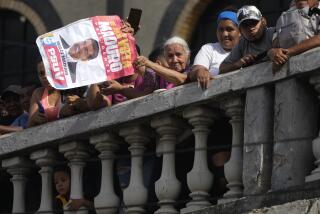Oil drop ends crude swagger
BOGOTA, COLOMBIA — As expected of a leader whose domestic revolution and foreign largesse depend on the wealth generated by oil exports, Venezuelan President Hugo Chavez took note of the sharp fall in crude prices last week.
But the populist leader insisted that his country would not “founder.”
“We haven’t gone crazy with this oil price surge, nor have we gone on some drunken [spending] binge,” Chavez told a ministers council. “We have saved and created strategic funds that we will use in a rational manner.”
Much as his opponents may hate to hear it, analysts agreed -- at least for the short term.
Jose Manuel Puente of the Caracas think tank known as IESA said the outspoken leftist has plenty of cash on hand to continue to pay debts, buy influence abroad and sustain huge food and gasoline subsidies at home under the banner of his “Socialism for the 21st Century.”
But Puente and others say Chavez could be in big trouble if prices continue to decline and fall below $50 a barrel in 2009. Then he could be forced to cut the subsidies, work programs and other policies that are the basis of his populist appeal.
Chavez’s dreams of regional leadership would also take a hit. Of Venezuela’s estimated daily production of 2.4 million barrels, about 120,000 are given to Cuba and 200,000 more are made available to 15 nations under the Petrocaribe foreign aid program, economist Gustavo Garcia said. That aid might have to be cut back.
Others fear a bleaker scenario if oil prices continue to fall and Chavez’s candidates fare poorly in crucial state and local elections next month. If that happens, Puente warned, Chavez could “radicalize” his revolution.
--
More to Read
Sign up for Essential California
The most important California stories and recommendations in your inbox every morning.
You may occasionally receive promotional content from the Los Angeles Times.










